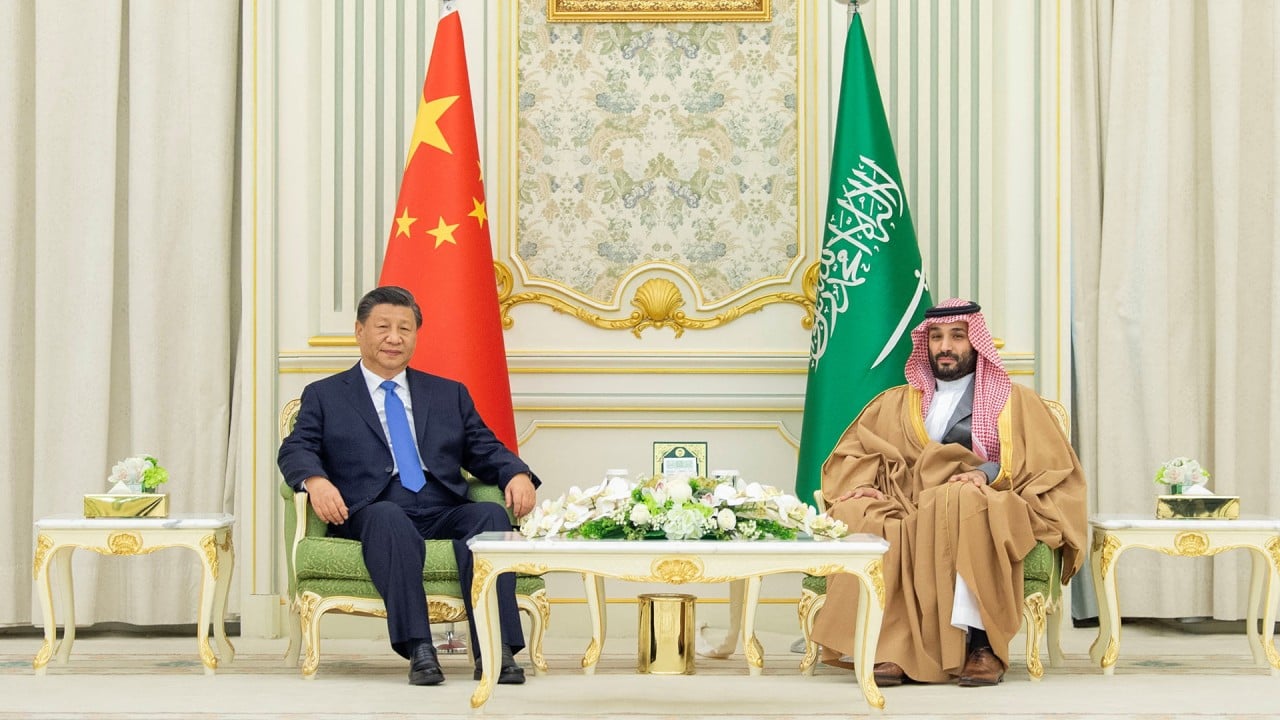
China pulls off balancing act in Middle East ties – but for how long?
- Iranian President Ebrahim Raisi’s visit to Beijing seen as show of solid relations, but it followed months of tensions after Gulf summit
- Agreement with Tehran could cause ‘ripple effect’ in regional diplomacy and provoke resistance from Israel and Saudi Arabia, observer says
The next day, he took the podium at the prestigious Peking University, where he called for joint resistance against threats from the United States and its allies before being awarded an honorary professorship.
China to push for revival of talks on Iran nuclear deal
After the meeting, China and the GCC released a joint statement calling for Iran to comply with the nuclear non-proliferation treaty and to work with the International Atomic Energy Agency (IAEA).
It also called for GCC member United Arab Emirates to negotiate with Iran to resolve territorial disputes over three islands in the Strait of Hormuz – an issue Iran says is non-negotiable.
The statement upset Tehran, which summoned Chinese ambassador Chang Hua to hear its side of the islands dispute.

Ma Xiaolin, an international relations scholar at Zhejiang International Studies University in Hangzhou, said Beijing was trying to “rebalance” its ties with Tehran and the Arab countries.
Ma said that unlike the US and many European countries, China had maintained friendly relationships with all conflicting parties in the Middle East and stayed away from disputes in the region.
“China’s role in the Middle East has been neutral and even transcendent,” he said. “[But] since the recent China-GCC summit, it seems to be more proactive and avoiding ambiguity on some sensitive issues.”
In a joint statement on Thursday, China and Iran pledged to work closely on politics and the economy, but stopped short of mentioning cooperation in the oil trade and the use of the yuan in bilateral trade and investment – areas that have drawn scrutiny from the West.
For the first time, the two sides also agreed to strengthen strategic communications between defence authorities and expand military exchanges and cooperation “at all levels”.
China urged to avoid ‘great power game’ with US in Middle East
They also stressed the importance of Israel’s participation in the non-proliferation treaty to effectively place its nuclear facilities under IAEA safeguards. This could upset Israel, Iran’s long-time adversary, which has repeatedly rejected such calls.
Thursday’s joint statement could cause a “ripple effect” in China’s diplomatic engagement in the Middle East and would likely provoke resistance from Israel and Saudi Arabia, according to Ma.
Tuvia Gering, a researcher at the Institute for National Security Studies’ Israel-China Policy Centre, said Israel would “definitely” push back.
“There’s no doubt that some tough talks will take place behind closed doors,” Gering said. “[But] will Israel’s dismay become public, or will Israel be able to use this new low to gain more concessions from Beijing, as Iran hoped with Raisi’s visit? I guess we will find out pretty soon.”
Fan Hongda, a professor at the Middle East Studies Institute of Shanghai International Studies University, said China’s balancing act in its Middle East policy was based on its friendly ties with all countries in the region, and Beijing was unlikely to change its strategy.
“Meanwhile, China will continue to strengthen economic cooperation with the region and to actively push for peace and stability in the region,” he said.
China is the largest trading partner to the Arab world and Iran, and the Middle East has been a crucial supplier of oil and gas to fuel the world’s second-largest economy.
With the US distracted from the Middle East and Russia struggling with its war in Ukraine and the resulting sanctions from the West, Middle Eastern countries have wanted to become “equal and peaceful partners” to world powers, according to Ma.
“Meanwhile, China may also wish to get more involved in the Middle East to offset pressure from the US,” he added.
China expected to maintain distance from Middle East conflicts
But Gering doubted whether Beijing’s policy was sustainable.
“For the Middle Eastern countries, China’s policy is not balanced, but contradictory, rendering it untrustworthy,” he said, adding that the US might also press its allies and partners in the Middle East to adjust their own relations with Beijing.
“Furthermore, there is always the risk that the Middle Eastern powder keg will explode, for example, in a conflict with Iran or an Arab Spring 2.0, requiring China to take a more clear stand in favour of one side or the other,” Gering said.
“Alternatively, if it sits out the conflict, as it typically does, the already low trust it has with its regional partners will deteriorate further.”


